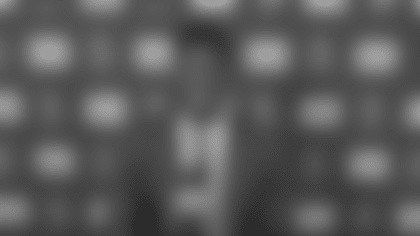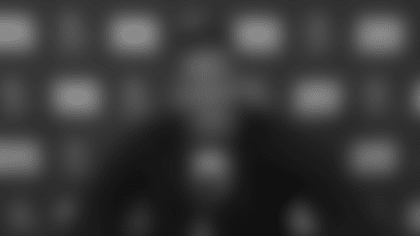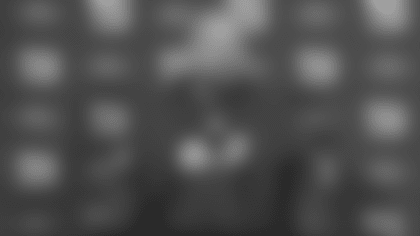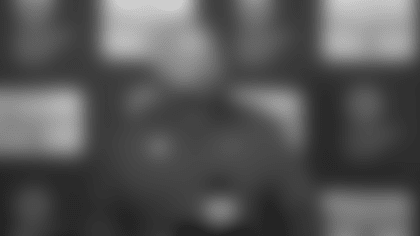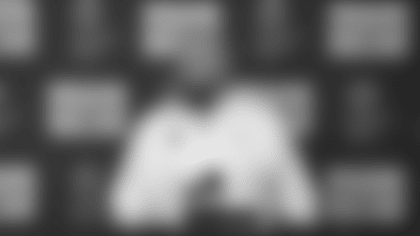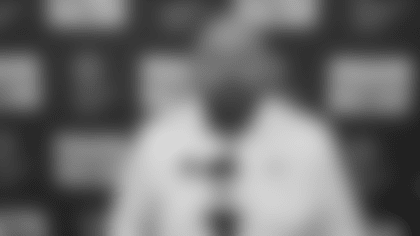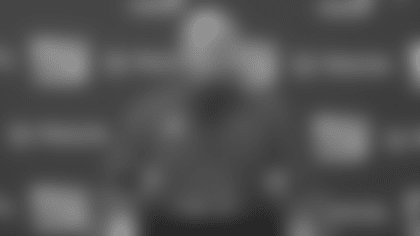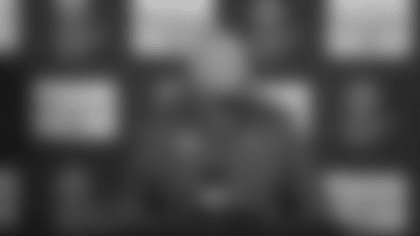Coach Tom Coughlin
Q: Jacquian Williams?
A: Yeah, he didn't work. We thought he would, but he didn't.
Q: Is that his shoulder or is it still the concussion?
A: I think it's the concussion.
Q: Are you close to having to shut him down?
A: All I know is that he didn't work today.
**
Q: Was the expectation coming into this week that you would have a chance to get him back? **
A: You asked me the other day. Yeah, it was a chance that he was going to practice and play. That's what we thought. He's in the third week.
Q: How did he look yesterday?
A: He seemed to be okay and then he gets symptoms.
Q: How tricky is this injury? You've had a couple guys stay in games, it seems like it's something that seems to be really hard for you guys, everybody really, to manage these kinds of injuries.
A: Why, what are you talking about? Manage them? A guy gets it in the game and he's out. You have all kinds of medical people there, they make the call. If they have any symptoms whatsoever, out they come.
Q: It just seems like such a hard thing to even recognize.
A: It's not hard to recognize.
Q: Jacquian played three quarters apparently. There were no symptoms but that's what I'm saying, it's a tough thing for teams to be able to…
A: It's not a tough thing. If the player has any kind of a symptom, if there's any kind of a contact helmet-to-helmet, they're right there with them. The doctors are there. They ask them their protocol questions. If the player has any kind of an issue, he's taken out of the game. If he doesn't, then he's allowed to play.
Q: Is there a reliance on the players reporting the symptoms?
A: Not necessarily, no. That's why they're all watching the field. There are medical people watching the field, too. They're watching it from the league office even.
Q: How long does he have to be symptom-free before he can even…?
A: He's got to pass the protocol.
Q: If Rashad Jennings can't go, would Orleans Darkwa be the second back behind Williams?
A: Yes.
Q: Is Rashad a sprained ankle?
A: Yes.
Q: Darkwa hasn't carried the ball for you obviously.
A: No, but he's done a nice job. He's been good on special teams, he's impressed everybody with how fast he's picked things up.
Q: If Cullen Jenkins can go, does he play some at end?
A: He will play, yes, all over the place. I'm hoping he can go. Thanks for asking.
Q: You obviously haven't had many seasons like this but I'm sure you've seen other losing teams where their locker room will disintegrate and there's a lot of sniping among players. That hasn't happened with your team yet. What does that say about your locker room…?
A: I don't expect it to happen at all. I think our players are solidly in support of each other and of what they're trying to accomplish. That's the furthest thing from anybody's mind that I can tell. The guys are very good about supporting each other, sticking together. The team concept is the key.
Q: They said they've talked about it amongst themselves. Is that something that you've had to address with them and say, 'Hey, look…'
A: I talk about it all the time, certainly.
Q: Is that something you take pride in?
A: I do, yeah. It's not easy.
Q: What kind of thing, as a coach, can you do to sort of make it stay together even when you go through a time like this?
A: Talk, speak, communicate, teach. That's what you do no matter what the capacity is, no matter what the issue is.
Q: Larry Donnell talked about how his health is something he's got to be careful with if he's getting up in the air. How do you help a guy get past that or not, how can a guy like that not put himself in those positions?
A: Talk about it. Try to show him examples of people who are in similar situations that may have turned or rolled or did something a little bit different rather than end up in the air on the way down. That's basically what it is. I talked about it in front of the team the other day, how I was concerned about him.
Q: You have those in mind? Do you spot guys that do it right and show it to him?
A: Yeah but the big man, the tall man at that position has some issues with it. He's got to fight his way through it. It takes almost the perfect kind of hit in order to put him in that position. Normally that's not the case.
Q: Who specifically do you look at?
A: You have to find examples of it. There's no one person. You just talk about the proper way that you would want him to tuck and roll and those kinds of things to make sure he doesn't get in that position.
DE Damontre Moore
Q: It's clear there are going to be a lot more snaps coming your way right now. How do you view that opportunity and what do you think you'll do with that?
A: Man, it's an opportunity. Any time an opportunity presented itself in the past, I've taken advantage of it. I've been waiting for it a long time. I'm just waiting to step up. I've been preparing a lot and then I had a lot of great veteran leadership that was in front of me within these past two years. I got to learn from Justin Tuck, Mathias Kiwanuka, Jason Pierre-Paul, so I feel like it's my time and I'm ready to take advantage of it.
Q: What are you most curious about about that when you get these extra snaps… what do you want to see from yourself?
A: Just go out there and have fun and do what I love to do. Just go out there and do my ability and just play the game that I love. That's the only thing I'm looking forward to. When I do that, things take care of themselves. Everything falls into place. That's my biggest thing, just getting out there. I'm ready.
**
Q: Do you feel you're further ahead in the run or the pass at this point? **
A: Definitely. Experience is our best teacher. I've had two years to get bigger, stronger and faster and just hone my skills and just take advice from Jason Pierre-Paul, who is such a great mentor. Honestly, like I said, I'm just ready to go out there and prove to everybody that I can do it, be an every down defensive end not just a third down pass rusher or situational guy. I want to go in there and put my team in the best situation.
Q: When Perry Fewell has talked about you, he has said that there are times in practice that you look great and there are other times that you are inconsistent. What do you have to do to be more consistent?
A: I think that's one of those things that I internally have to fight with. Being a young guy and being so accustomed to coming in, playing early as a true freshman in college, I felt like something was supposed to be given me, which, at this level, nothing's going to be given to you. I feel the same type of way and that's my fault. I prolonged that process. But like I said, experience is the best teacher. Sometimes what they say, a hard head makes a soft behind. That was one of those things.
Q: When you looked at the tape of the Titans' offense, specifically Mettenberger, the rookie quarterback, what do you see there?
A: You see a talented quarterback. I've seen what I saw in college – a great competitor, a great arm. He's going to compete and he's going to talk trash. That's one of those quarterbacks that I like to play against. That way once you get out there and beat them, it is what it is.
Q: Coach Coughlin had said that you had started to gain some bulk and then you dropped off a bit. Do you feel you're at a point now physically where you want to be?
A: I definitely feel like I'm at a point where I want to be, but also, there's always room for improvement and always more room to get better. Honestly, I'm just going to try to get better each and every day. If I'm not doing that, then I'm not doing my job.



